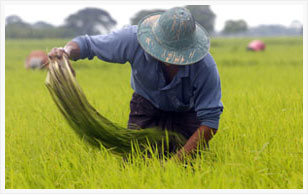 China has offered to train Kenyan rice farmers in modern large-scale production techniques to raise their yield five-fold from the current paltry 50 tonnes per acre.During President Uhuru Kenyatta’s tour of the China National Rice Research Institute (CNRRI) in the southern Chinese city of Hangzhou, the institute said that it was prepared to set up a model farm and research facility to assist Kenya meet its food security goals.
China has offered to train Kenyan rice farmers in modern large-scale production techniques to raise their yield five-fold from the current paltry 50 tonnes per acre.During President Uhuru Kenyatta’s tour of the China National Rice Research Institute (CNRRI) in the southern Chinese city of Hangzhou, the institute said that it was prepared to set up a model farm and research facility to assist Kenya meet its food security goals.
“We are ready to share our expertise in rice production with Kenyan farmers. Cooperation in this area offers and important avenue to enhance our two countries’ relations,” said CNRRI Director-General, Cheng Shihua.
President Kenyatta welcomed the offer, saying that close collaboration and partnership with China in rice production, a major rice producer country, would bolster Government’s effort to make Kenya self-sufficient in food production.
He said increasing rice yields would significantly enhance food security, in line with the Jubilee Coalition’s manifesto.
“China has made a lot of progress in rice production. This is one area where we could collaborate to ensure our people have sufficient food at affordable prices,” the President said.
The China National Rice Research Institute conducts research to improve rice yields, grain quality and pest resistance cost-effective rice cultivation technologies.
The President said modern farming techniques would reduce the cost of production and ensure farmers realize profits from their labour. He underscored the importance of research in food production which would ensure farmers adopted best practices and take farming as a business.
The Jubilee Coalition has pledged to increase efficiency in agricultural production through mechanization and employment of modern technology.
President Kenyatta’s visit to China’s top rice research institute is viewed as a step towards forging working partnerships that will help achieve self-sufficiency in food production.
The President is accompanied on his first state visit to China by First Lady Margaret Kenyatta, Governors Evans Kidero and Kenneth Lusaka, Senators, and senior government officials.
Kirinyaga Senator David Karaba, who is in the delegation, said touring the institute was an eye-opener because farmers in his Mwea rice growing district were using archaic farm methods and had ineffective pest control which undermined yield.
“What we need is an institute of this kind in Mwea to rescue farmers. It would help with better crop husbandry, lower costs, raise yields and improve earnings,” Karaba said.